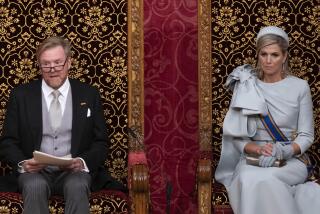Stern Mandela Talks Tough on Crime : South Africa: President takes law-and-order stance in wake of violence surge, but he offers no specifics.
- Share via
JOHANNESBURG, South Africa — In an unusually sharp State of the Nation address Friday, President Nelson Mandela read the riot act to a country increasingly beset by violent crime, labor unrest and challenges to government authority.
Mandela opened the second session of South Africa’s all-race Parliament in Cape Town with a stern warning to those causing “anarchy in our society.”
“I speak of those who engage in such totally unacceptable practices as the murder of police officers, the taking of hostages, riots, looting, the forcible occupation of public buildings, blocking of public highways, vandalization of public and private property and so on,” he said.
They “misread freedom to mean license” and took advantage of democracy to “impose chaos on society,” Mandela said in the nationally televised speech to a joint sitting of the Senate and National Assembly.
“Let it therefore be clear to all that the battle against the forces of anarchy and chaos has been joined,” he declared. “Let no one say they have not been warned.”
Despite the tough new law-and-order line, the 76-year-old leader gave no indication how the three-party coalition government would deal more forcibly or effectively with recent disturbances--from illegal squatters who have occupied new homes to militant labor strikes marred by severe vandalism and assault.
Political violence has dropped dramatically since April’s all-race elections, although about 100 people are still killed each month in massacres, assassinations and internecine warfare, mostly in KwaZulu-Natal province.
But reported violent crime has surged to record levels.
Mandela condemned racial clashes earlier this week in the Cape Town suburb of Ruyterwacht, where right-wing whites armed with chains and whips terrorized black children bused to an empty neighborhood school.
Riot police prevented several thousand blacks from demonstrating in Cape Town on Friday after students rampaged through the downtown Thursday, assaulting passersby.
In the speech, which lasted more than an hour, Mandela departed from his usual theme about lifting the lot of the impoverished black majority. He simply said his government was “well on its way to finalizing detailed plans” to meet campaign pledges for improved housing, schools, health care and other services.
*
But Mandela warned that his government did not possess “a big bag full of money” to meet the needs of the poor. And he spoke out against what he called a “culture of entitlement.”
“It is important that we rid ourselves of the culture of entitlement, which leads to the expectation that government must promptly deliver whatever it is that we demand,” he said.
As he has before, Mandela blamed the previous, apartheid-era regime for saddling his government with heavy debts and a legacy of corruption.
Scandals have swirled around several members of Mandela’s administration, including his estranged wife, Winnie Mandela. No one has been charged, however.
The president made an appeal to the mostly white civil service to address “racial and gender imbalances” left over from apartheid.
Most jobs in the public sector were guaranteed in negotiations that paved the way for the April elections, and affirmative action remains highly sensitive.
Mandela warned of “false prophets who seek to perpetuate the apartheid divisions and imbalances of the past by presenting affirmative action as a program intended to advantage some and disadvantage others on the basis of race and color.”
Mandela cited his “continuing commitment to fiscal discipline,” including cutting the budget deficit.
Government figures released this week showed the gross domestic product rose 2.3% last year, the highest growth in five years. Economic growth is expected to top 3% in 1995.
More to Read
Sign up for Essential California
The most important California stories and recommendations in your inbox every morning.
You may occasionally receive promotional content from the Los Angeles Times.














